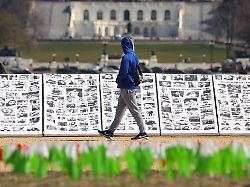Asset and entry bans
EU foreign ministers impose new sanctions on Iran
03/20/2023, 7:43 p.m
The mullah regime in Tehran uses violence and death sentences against demonstrators. The EU foreign ministers are now tightening sanctions against the Iranian judiciary. However, the Revolutionary Guards are still not on the list of terrorist organizations.
The European Union has tightened its sanctions against Iran for the third time since the beginning of the year. The EU foreign ministers imposed property and entry bans on eight people and one institution in Brussels, as the Council of Member States announced. Among them are mainly members of the Iranian judiciary. The EU holds them responsible for unjustified death sentences against demonstrators.
Federal Foreign Minister Annalena Baerbock welcomed the sanctions package in connection with the demonstrations for more freedom rights that have been going on for months. The Europeans made it clear “that we are not turning a blind eye to the serious human rights violations being committed by the regime in Iran,” said the Greens politician in the Belgian capital.
204 people and 34 organizations on the list
New to the list of sanctions are the High Council of the Cultural Revolution, which restricts the freedom of women and girls. In addition, the new punitive measures will affect clerics of the Islamic Republic, who, according to the EU statement, “foment hatred against women”. The EU sanctions list now includes a total of 204 Iranian officials and 34 organizations held responsible for human rights violations.
However, the EU is still unable to meet a central demand of the Iranian opposition: the classification of the Iranian Revolutionary Guards as a “terrorist organization”. According to diplomats, the prerequisite would be a court judgment against the Revolutionary Guards on terrorism allegations in at least one member country.
The EU foreign ministers also adopted a joint declaration on Afghanistan. They condemned the “systematic violation of human rights” by the radical Islamic Taliban. Among other things, women and girls, members of ethnic and religious minorities as well as queer people and journalists are affected, it said.
